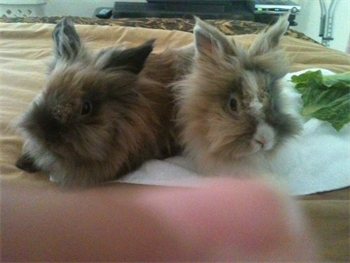House Rabbit Community and Store
What are we about? Please read about our Forum Culture and check out the Rules.
The subject of intentional breeding or meat rabbits is prohibited. The answers provided on this board are for general guideline purposes only. The information is not intended to diagnose or treat your pet. It is your responsibility to assess the information being given and seek professional advice/second opinion from your veterinarian and/or qualified behaviorist.
› FORUM › DIET & CARE › convulsions
- This topic has 14sd replies, 9 voices, and was last updated 18 years ago by
 Bunnies4ever.
Bunnies4ever.
-
AuthorMessages
-
-
02/15/2008 at 6:55 AMI just found out a rabbit I gave to a neighbor died on monday. They said that she seemed healthy and ate fine, but 5 minutes after eating went into convulsions and died. I have heard that epilepsy(sp?) runs in lionheads so I was wondering if that is a possiblilty and if I should alert the owners of his siblings that that happened.
-
02/15/2008 at 7:09 AM
I think that you probably need to do a bit more investigating into the care of the rabbit prior to her passing away. Ask them what they fed her, how she was cared for, where she lived (indoors or outdoors?), what she was eating when went into convulsions, and how she had been acting prior to the situation. There are so many different things that could cause a rabbit’s death that I would find out all of the details first.
-
02/15/2008 at 7:23 AM
I agree, it’s not enough information. Sometimes I’ve had vets even do autopsies on my rabbits that passed away unexpectedly and sometimes they weren’t even able to tell why that particular rabbit passed away.
While I’ve heard that lionheads can have some issues like this, I don’t really know enough about that either since I don’t have any first-hand experience with it.
-
02/15/2008 at 7:43 AM
Yeah, I’ll ditto what Sarita said. It’s best to look for more info. I’ve also heard about epilepsy running in lionheads, but honestly, myself and several members have them and *knock on wood* fortunately none of us have had a seizure.
What I’ve read on epilepsy in lionheads is that they will die several hours after a seizure….I’m not a vet, but what’s described almost sounds like poisoning? Maybe he ate something toxic? I don’t know …
This is terrrible to have happened, and I’m sorry for the owners. Welcome to binkybunny and sorry that this is your first post….
-
02/15/2008 at 8:25 AM
Hi leti2pets! I’m so glad you came in, I left the message for you on craigslist this morning (OwnedByBunnies) I’m sorry your first post is such a sad one, but I’m glad you’re here! From what I’ve learned here about how sensitive the rabbits digestive system is, it would certainly be difficult to pin it down, unless there was a toxic house plant with a bites out of it or something like that.
Hope to read more about your lionheads!
Kathy -
02/15/2008 at 8:30 AM
I’m so sorry that happened! Before I got my lionheads, I did extensive research, and yes, lionheads are prone to seizures, but the breeders are not sure why. An autopsy will have to be performed to be sure. So far, my rabbits have not had any seizures, but I always keep an watchful eye on them. For some reason, I think it’s the lionheads from the UK who seem to be more prone to seizures, not sure why. It does sound like maybe the rabbit ate something toxic, maybe something in the food. They do thrash about when they have a seizure and sometimes bang their heads against the cage. Some die immediately and some do come back, just like humans and are fine until the next one.
-
02/15/2008 at 8:35 AM
Oh that’s right bunnies4ever, i’d read that too! Are lionheads in the UK full size? I thought maybe they were and ours are dwarfs…so maybe that’s why ours aren’t really prone to seizure (not that being a dwarf does anything, just that they are from different bloodlines)
-
02/15/2008 at 8:44 AM
From the pictures that I’ve seen, they seem to be a little bigger, but not too much. Also I read that the breeders are trying to figure out how to breed the epilespy out of them, but that could take years, but currently there is not too much you can do for them. I remember reading and digesting all that information and it scared the heck out of me, but I went ahead and adopted not one, but two!
-
02/15/2008 at 10:53 AM
omg lionheads are prone to epliepsy? anything i can do or should be alert of in my lionhead?
-
02/15/2008 at 11:02 AM
Yes there is. Keep an watchful eye on your bunny as they can have a seizure when you’re not home or around. If you see any torn fingernails, a bloody nose or missing patches of hair, it MAY indicate that your bunny has had a seizure. They can have seizures lasting only a few seconds to as long as 30 seconds. It just depends. Some bunnies do come around after a few minutes, and sometimes it will kill them, but there isn’t too much you can do.
-
02/15/2008 at 11:05 AM
Here is some info I found:
Lionheads and Seizures
My exploration into this question has revealed that Idiopathic Epilepsy is a problem in certain bloodlines of Dwarf rabbits in Europe and to a lessor extent in Dwarf Rabbits in England. Since the Spring issue of the English Lionhead Club Newsletter includes a statement that it is now time for the breeders in England to “STOP crossing to other breeds to introduce additional colors”, it is logical to assume the Dwarf Rabbit has been used in breeding Lionheads in England.
The repeated stories of seizures in Lionheads in the United States fit the description of Idiopathic Epilepsy.
They can not be attributed to injury or poison.
They do not result in the direct death of the rabbit.
They most often onset with no warning and manifest in grand mall form.
The rabbit recovers from the seizure to just have another days, weeks or even months latter.The stories are varied but all fit the framework of Idiopathic Epilepsy. A young Lionhead has his first seizure when 8 weeks old at weaning. One doe seized when she was placed with a buck for breeding. I also just had a nice buck have a horrible seizure after a servicing a doe. (He had successfully been used before). Another young Lionhead (about 5 months old) had it’s first seizure when being groomed for a show.
Most often owners simply say they were in the rabbitry doing chores when suddenly the Lionhead was thrashing in it’s cage. The rabbits all recover and are able to resume normal activity. Nothing in any of the reports would make me think of poisoning or injury. (Some breeders think this is wry neck – it is not. WRY NECK DOES NOT COME ON SUDDENLY LAST MINUTES AND CLEAR UP)
The susceptibility for generating an epileptic seizure varies within the individual. Some may have a lower threshold for epileptic seizures and are therefore more likely to develop this condition. Though this a genetic condition it can take time to manifest. Often seizures are be triggered by external stimulation.
TREATMENT
There is no true cure as this condition is genetically encoded in the rabbit’s makeup. We can offer support. Since over all seizures are uncommon in rabbits, it can be difficult to find extensive information on treatment or a Veterinarian who has the knowledge to help a rabbit owner deal wit this problem.
If you find yourself with a Lionhead pet who has seizures there are some things the owner can so. Control of the environment can be important as often bright light and over handling will induce a seizure. Seizures can be triggered by external stimulation.
If you find yourself confronted by a Lionhead who is haveing a seizure, often simply placing the rabbit in a SMALL cage enclosure that is dark, cool and quiet is all that is needed. Remember it is always wise to contact your veteranary for support and information.
If the seizure should last for any length of time it is important to get veterinary help at RIGHT AWAY. The act of seizing can raise the body temperature to dangerous levels. Remember when handling a seizing Lionhead they no longer have any idea of where they are or who you are. Support of the back is very important if you must lift the rabbit to move it to a safe place.
If you do find yourself with an Epileptic Lionhead this information may be of help to your veterinarian. To stop seizures, diazepam (1-2 mg/kg IV, IM) or midazolam (1-2 mg/kg IV, IM) should be given immediately.
WE MUST NOT HIDE THE PROBLEM.
This breed is very young and we can beat this thing if we all work together. Let potential buyers know. If a propective buyer should decide the breed is what they want that should be fine with all of us. We love our breed and we are willing to tackle and solve this problem, but not everyone else is. People who are buying Lionheads need to know. They need to be aware that this is a potential problem so they will be prepared if it should happen to their Lionhead. -
02/15/2008 at 12:34 PM
I don’t know if she ate anything she shouldn’t since I wasn’t there when it happened. If death is usually a few hours later I suppose that it wasn’t epilepsy since they said it was preaty quick. Thanks for the information.
-
02/15/2008 at 2:08 PM
Oh my…thanks for the info!
-
02/15/2008 at 2:43 PM
If lionheads are prone to seizure, can someone tell me if this applies to a half-lionhead? My daughter has one and I want to be sure she knows what to look for.
-
02/15/2008 at 3:11 PM
Sorry, I can’t give you a definitive answer. It’s genetic and your daughter’s bunny may never have a seizure. I’ve had mine for 2 years and have never encountered any problems. They are extremely healthy. The info I posted earlier says that external stimulation can bring on a seizure, i.e., rough handling, bright lights.
-
-
AuthorMessages
- You must be logged in to reply to this topic.
› FORUM › DIET & CARE › convulsions

